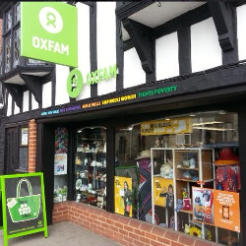Oxfam GB is running a trial of near-field communication technology to allow supporters to both donate to the charity and find out more information about what it does through interactive posters and wristbands.
The trial, which has been split into two parts, aims to make use of near-field communication (NFC) technology and is a way to make it “easier for people to engage with Oxfam, see more content or find out more about its work”.
Matt Jerwood, digital fundraising lead at Oxfam GB, told Civil Society News that one part of the trial involves posters with built-in NFC tags in Oxfam shops in Henley-on-Thames and Northampton. These have been programmed to open a pre-filled message when scanned by a phone with NFC technology built in. The supporter then only needs to click 'send' to complete the £5 or £3 donation.
Jerwood said that part of the thinking behind this is because shops aren’t always open, so it is a way for anyone to support Oxfam “day or night”.
Wristbands for street fundraisers
The second part of the trial involves street fundraising, which Jerwood has described as “potentially more interesting application” of the technology.
He said: “We have given some of our street fundraisers wristbands with NFC tags on them. When they have a conversation with a supporter we're able to say would you like to find out more about the work that Oxfam does and the work that your donation is supporting?'
"People are able to tap on the wristband and it redirects the supporter's phone to a short video showing some of the things Oxfam did in 2014. All this does is tell the phone to open a URL or go to a text message with details in it. At its heart it is pretty simple, but it is quite cool as well.”
Jerwood said that the cost of these trials is low, under £100, as creating both the NFC tags and posters is very cheap.
The trial has been associated with one of Oxfam’s existing campaigns, the Strength to Survive appeal, which is being match-funded by the Department for International Development. Jerwood said that he hoped people would be more inclined to support the charity because their donation is doubled.
The donation side of Oxfam’s NFC trial will run for a few months, while the street fundraising side is likely to run a bit longer.
Jerwood said: “What we are mindful of is that we need to give it enough opportunity to tell us something interesting, we have posters in shop windows with text codes on and we have these photos in shop windows with NFC tags on and we want to see if anyone will respond to posters in windows, and if so are they more likely to use NFC than the text code.”
He went on to say that although there is a barrier in that Apple devices do not currently support the technology, if the trial is successful there is no reason why it wouldn’t be normalised in posters across windows.
Cancer Research UK conducted a similar trial earlier this year using NFC technology.
- Book your place at the Charity Technology Conference 2015, to be held at the Mermaid on Thursday 19 November, here.









